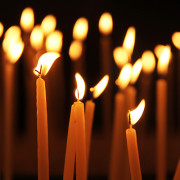Dust and ashes
John A. Braun
The cities nestled comfortably in the valley. The green meadows stretched out almost as far as one could see. A short time before, he and his nephew had looked at the same valley where the Jordan turned everything so beautiful. Lot chose the rich pastures in the Jordan valley. Abraham went the opposite direction to avoid quarrels over grazing rights.
Then the Lord chose to visit Abraham and confirm his wonderful promise. Abraham’s descendants would fill the land that now provided a meager pasture for his flocks. Sarah would have a child in her old age. That son would confirm the promise that from those descendants a Savior would come—a great Son in the future who would redeem the world from its folly and sin and death.
Abraham could see the place Lot had chosen from where he was. Yes, the green meadows still stretched out beautifully along the river. But what God saw was not the beauty of the valley. He saw cities filled with sin and wickedness. He told Abraham that the outcry of their sins was grievous and that judgment was coming (Genesis 18:20,21).
God doesn’t often share information about his timetable. But he does warn us of the trouble that will come and has come in this perverse world. Like Lot, we become comfortable with sin and wickedness. We live side by side with it. We learn to adapt so we avoid evil as much as we can. We accommodate.
Will disaster come unexpectedly in some limited way and wipe away our green valley of prosperity, comfort, and beauty? The next day Abraham saw dense smoke rising from the land. The beautiful valley was changed.
But what lessons can we learn? First, God doesn’t share the reasons for the sudden destruction that comes from time to time. But we do know that even these things will somehow serve his believers. Perhaps they are reminders of what is essentially important for us—family, health, and Savior—all from a God who loves us more than we deserve. Perhaps it’s a call to repentance or a reminder of the final destruction of this world.
Second, I hear the words of Abraham when God told him what was about to come. He prayed for the people, “Will you sweep away the righteous with the wicked?” (Genesis 18:23). It was a bold prayer from a man who confessed he was “nothing but dust and ashes” (Genesis 18:27). He knew that he was no better than those in the valley cities, but he also knew that his nephew Lot and his family were among them.
His boldness in prayer came from the promise God had made: A Savior was coming. That assured Abraham of God’s boundless love. So he prayed to God for those he knew and loved as well as for those he did not know.
Where are we? Are we at some advantage point where we can see a society that has abandoned morality, common sense, decency, honesty, and dignity? Do we wonder if judgment is only a night’s sleep away and we will awake to destruction and chaos?
Like Abraham, we are “nothing but dust and ashes.” God doesn’t owe us anything, but he graciously gives us everything in Jesus—a Savior born in the land where Abraham tended his flocks. So we pray both for those we know and love and those we do not know—even our enemies.
Then we let God be God. He decides what’s best. We are only dust and ashes, but we know how deeply God loves us whether we live in the green valley or we’re digging out of the rubble.
SUBMIT YOUR STORY
Do you have a manuscript, idea, or story from your own life you’d like to share for use in Forward in Christ or on wels.net? Use our online form to share it to our editorial office for consideration.
SUBSCRIBE TO FORWARD IN CHRIST
Get inspirational stories, spiritual help, and synod news from Forward in Christ every month. Print and digital subscriptions are available from Northwestern Publishing House.
Author: John A. Braun
Volume 103, Number 7
Issue: July 2016
Copyrighted by WELS Forward in Christ © 2021
Forward in Christ grants permission for any original article (not a reprint) to be printed for use in a WELS church, school, or organization, provided that it is distributed free and indicate Forward in Christ as the source. Images may not be reproduced except in the context of its article. Contact us






